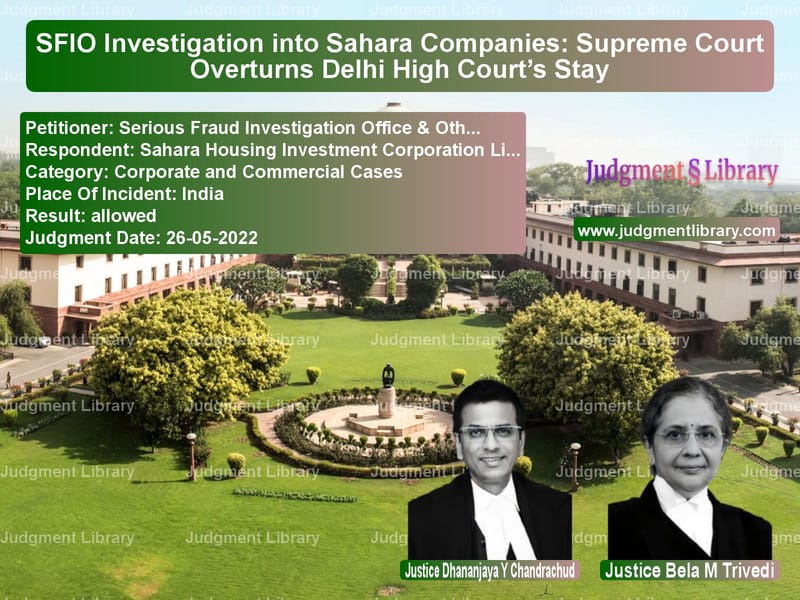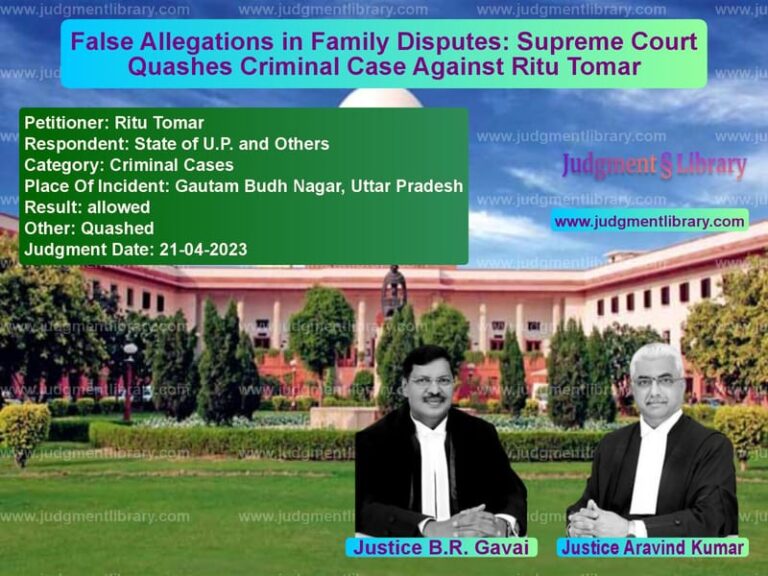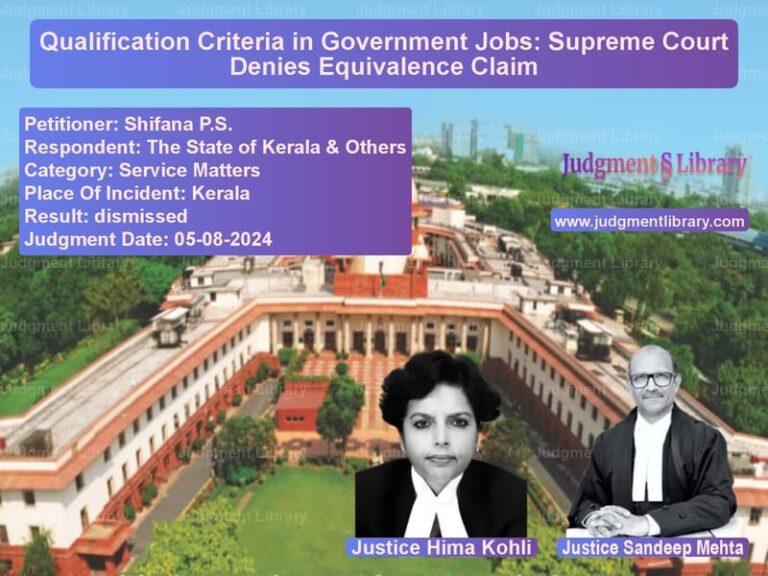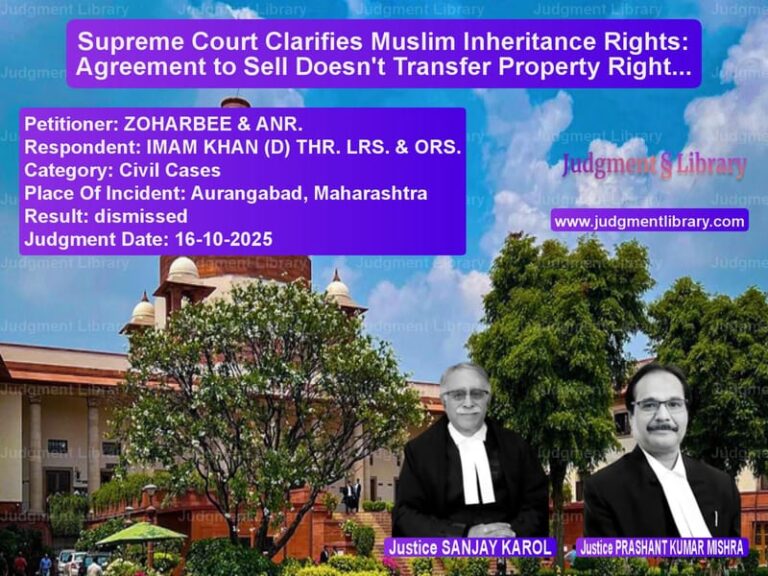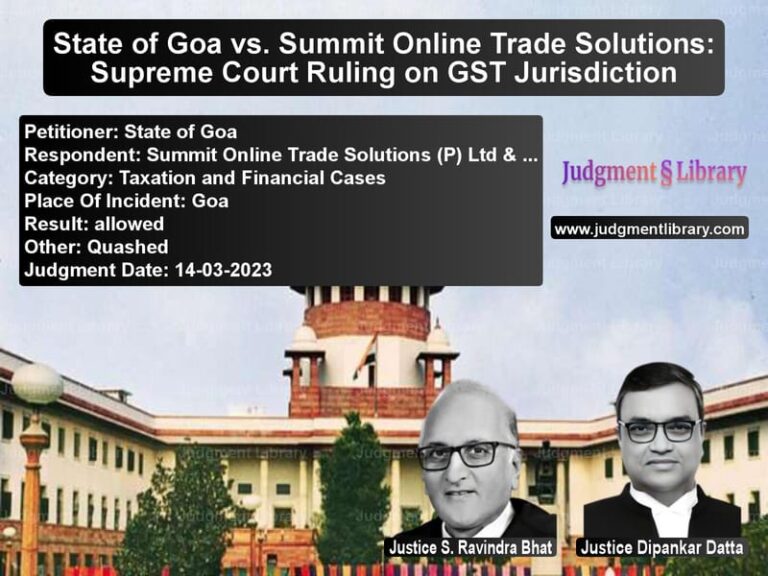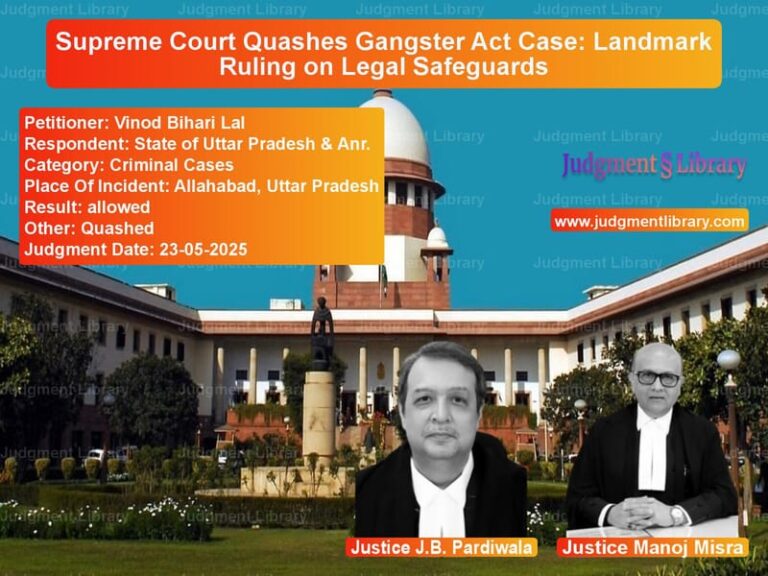SFIO Investigation into Sahara Companies: Supreme Court Overturns Delhi High Court’s Stay
The Supreme Court of India, in a significant ruling, set aside the Delhi High Court’s interim stay on the investigation into multiple companies linked to the Sahara Group. The case, Serious Fraud Investigation Office & Others vs. Sahara Housing Investment Corporation Limited & Others, revolved around the legality of the government’s decision to probe various Sahara Group entities under the Companies Act, 2013. The Supreme Court upheld the government’s authority to conduct an investigation and emphasized that courts should not interfere in ongoing investigations at the interlocutory stage.
Background of the Case
The case originated from orders issued by the Ministry of Corporate Affairs (MCA) on 31 October 2018 and 27 October 2020, directing an investigation into the affairs of several Sahara Group companies. The government relied on reports by the Registrar of Companies, Mumbai, and requested an in-depth probe by the Serious Fraud Investigation Office (SFIO).
The primary objective of the investigation was to examine financial transactions, governance issues, and alleged fraudulent activities within these companies. The following Sahara Group companies were included in the probe:
First Phase (31 October 2018)
- Sahara Q Shop Unique Products Range Limited
- Sahara Q Gold Mart Limited
- Sahara Housing Investment Corporation Limited
Second Phase (27 October 2020)
- Aamby Valley Limited
- Qing Ambay City Developers Corporation Ltd.
- Sahara India Commercial Corporation Limited
- Sahara Prime City Ltd.
- Sahara India Financial Corporation Limited
- Sahara India Real Estate Corporation Limited
Key Legal Issues
- Whether the Delhi High Court was justified in staying the SFIO’s investigation.
- Whether the orders issued under Sections 212 and 219 of the Companies Act, 2013, were legally valid.
- Whether the investigation orders were properly reasoned and supported by material evidence.
Arguments by the Petitioners (Serious Fraud Investigation Office)
The SFIO, represented by Solicitor General Tushar Mehta, argued that:
- The High Court’s stay order was contrary to the Supreme Court’s established precedent, which discourages judicial interference in ongoing investigations.
- The MCA had ample reasons to believe that these companies were involved in financial misconduct, warranting an SFIO investigation.
- The three-month period mentioned in Section 212(3) for completing an investigation was directory, not mandatory, as previously held by the Supreme Court in SFIO vs. Rahul Modi (2019).
- The six additional companies included in the second-phase investigation were linked to the original three through financial transactions and common control, justifying their inclusion under Section 219 of the Companies Act.
- The High Court misinterpreted the law by insisting that only holding or subsidiary companies could be investigated under Section 219, ignoring the provision’s broader scope.
Counterarguments by the Respondents (Sahara Group)
The respondents, represented by senior advocate Kapil Sibal, contended that:
- The companies under investigation had already deposited Rs. 24,000 crores with SEBI in compliance with a Supreme Court order in 2012, negating any financial misconduct claims.
- The transactions in question occurred before the enactment of the Companies Act, 2013, raising doubts about the applicability of its provisions.
- The government’s investigation orders lacked specific reasons and failed to establish a direct link between the newly added companies and the initial three.
- The MCA had not demonstrated that the directors of the second-phase companies were acting under the control of the original three, as required under Section 219(c).
Supreme Court’s Observations
The Supreme Court, after reviewing the arguments, ruled that the High Court had erred in granting an interim stay on the investigation. The Court emphasized that:
1. The Time Limit in Section 212(3) is Directory, Not Mandatory
“There is no stipulation of any fixed period for the completion of an SFIO investigation, and the expiration of the three-month period does not invalidate the probe. If this were the case, serious frauds would remain beyond investigation.”
2. Section 219(c) Justifies Expanding the Investigation
“Clause (c) of Section 219 allows an investigation into any company whose board acts under the instructions of another company. The government’s order clearly referenced financial entanglements between the six additional companies and the original three.”
3. Courts Should Not Interfere in Investigations at the Interlocutory Stage
“An investigation is merely an inquiry to determine whether misconduct has occurred. Courts should refrain from passing interim orders that effectively halt an investigation before any findings are made.”
Final Judgment
The Supreme Court ruled as follows:
- The Delhi High Court’s stay order on the SFIO investigation was set aside.
- The SFIO was permitted to continue its probe into all nine Sahara companies.
- The High Court was directed to expedite the hearing of the writ petitions and attempt to resolve them within two months.
Impact of the Judgment
This ruling has several significant implications:
- Strengthening SFIO’s Powers: The judgment reinforces the SFIO’s ability to conduct in-depth investigations into corporate fraud without premature judicial interference.
- Clarity on Section 219: The ruling expands the interpretation of Section 219, allowing investigations into interconnected companies beyond just holding and subsidiary relationships.
- Judicial Restraint in Investigations: The Court reaffirmed that investigations should be allowed to proceed unless there is clear evidence of abuse of power.
- Implications for Corporate Governance: Companies with complex structures and interrelated entities may face increased scrutiny under the Companies Act.
With this decision, the Supreme Court has sent a clear message that investigations into corporate fraud must not be obstructed without compelling reasons, ensuring that regulatory authorities can effectively enforce financial transparency and accountability.
Petitioner Name: Serious Fraud Investigation Office & Others.Respondent Name: Sahara Housing Investment Corporation Limited & Others.Judgment By: Justice Dhananjaya Y Chandrachud, Justice Bela M Trivedi.Place Of Incident: India.Judgment Date: 26-05-2022.
Don’t miss out on the full details! Download the complete judgment in PDF format below and gain valuable insights instantly!
Download Judgment: serious-fraud-invest-vs-sahara-housing-inves-supreme-court-of-india-judgment-dated-26-05-2022.pdf
Directly Download Judgment: Directly download this Judgment
See all petitions in Corporate Governance
See all petitions in Bankruptcy and Insolvency
See all petitions in unfair trade practices
See all petitions in Judgment by Dhananjaya Y Chandrachud
See all petitions in Judgment by Bela M. Trivedi
See all petitions in allowed
See all petitions in supreme court of India judgments May 2022
See all petitions in 2022 judgments
See all posts in Corporate and Commercial Cases Category
See all allowed petitions in Corporate and Commercial Cases Category
See all Dismissed petitions in Corporate and Commercial Cases Category
See all partially allowed petitions in Corporate and Commercial Cases Category

